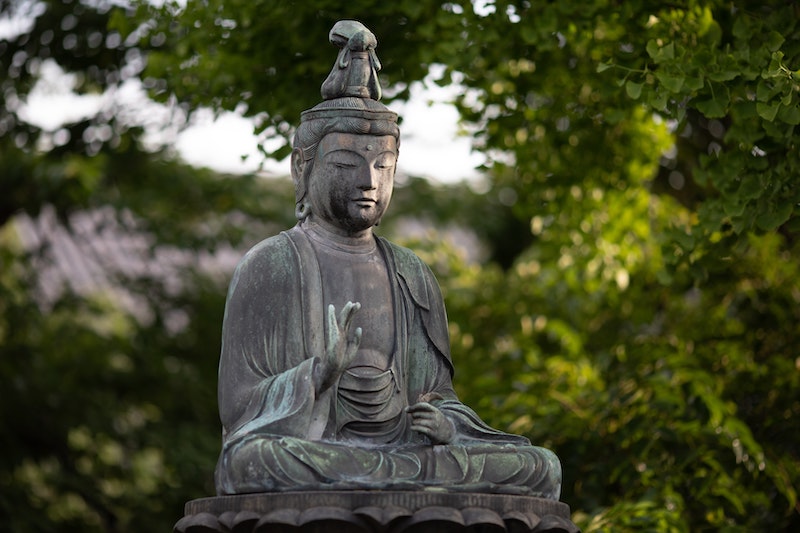Right Intention is the second tenet of the Noble 8-Fold Path. It represents the strong resolve that practitioners develop to end suffering for themselves and others when they walk the Buddhist path. On the surface, this seems like a no-brainer. No one wants to suffer, and everyone hopes for a peaceful life. So, why is right intention necessary?
An easy way to think about it is to imagine a small child who stays up past his bedtime to watch TV. He has to wake up early to go to school, and he knows it. He also knows that he’ll be tired and cranky all day if he doesn’t get enough sleep. But he’s so caught up in his desire to watch TV that he doesn’t care. Things like “waking up early” and “getting enough rest” are too abstract, too far off into the future to matter. But his TV show is right here in front of him. And it’s real, and it’s fantastic, and he can think of nothing else. So, he stays up late, and he suffers as a result.
When we’re trapped in the mind of desire, we’re just like the child watching TV. We know that our actions will have consequences. And sometimes we know exactly what those consequences will be. But we’re so caught up in the short-term pleasure of what we’re doing that we don’t care about who we hurt; even if the person we hurt is ourselves.
That’s why right intention, which could also be called right vow is so important. It’s a promise we make to ourselves and others that we’ll prioritize the end of suffering over our desires. It represents our strong determination to grow in our Buddhist practice. In the bible, 1 Corinthians, chapter 13: 11 states:
When I was a child, I spoke as a child, I understood as a child, I thought as a child; but when I became a man, I put away childish things.
For Buddhists, sensual desires (wealth, status, animosity, etc.) are the “childish things” that we must put away. Right view helps us to see what those things are, and right intention gives us the strength to let them go. This happens in the same way that a child learns to turn off the TV, and go to bed at a decent hour once they become an adult.
In his wisdom, Buddha taught that there are three types of vows that can assist us in the practice of right intention. They are as follows:
- Vows of renunciation- These help us create strong determination to let go of actions and mental habits that cause harm to ourselves and others.
- Vows of goodwill– These help us create strong determination to act in ways that create happiness for ourselves and others.
- Vows of harmlessness– These help us create strong determination to act in ways that remove suffering from our life and the lives of others.
These practices are important because they help us counter the three poisons of greed, anger, and ignorance that result in all of human suffering. That is to say, renunciation counters greed, goodwill counters anger, and harmlessness counters ignorance. So, the tenet of right intention helps to extinguish the poisons in our heart, and moves us closer to nirvana.
From a traditional, Buddhist standpoint our vows may take the form of renouncing drugs and alcohol in our daily life or creating good-will through the use of daily metta (loving-kindness) meditations. In a more conventional sense, we may commit to giving 5 compliments to other people each day (good will), or refusing to argue with people on social media (harmlessness).
As our commitment to the Dharma grows, our commitment to right intention also grows. Eventually, our vows of renunciation, goodwill, and harmlessness stop being about Buddhism, and they shift to simple, daily habits that we enjoy. When this happens we stop turning the TV off at night for fear of being tired. Instead, we turn it off because we enjoy getting a full night’s rest.

